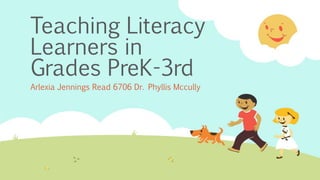
Teaching Literacy Learners in Grades PreK-3rd
- 1. Teaching Literacy Learners in Grades PreK-3rd Arlexia Jennings Read 6706 Dr. Phyllis Mccully
- 2. Creating a Literacy Environment Teachers must have self-efficacy to promote student learning (Black, 2015) Literacy Framework (Five Pillars) should be incorporated in teaching practices. Framework of Literacy Instruction (Three Perspectives: Foundational, Interactive, and Critical) A Guide for teachers Teachers should know their students Choose appropriate text for teaching Evaluate Instructional practices ((Learning about the Framework of Literacy Instruction, 2016)
- 3. Getting to Know the Emergent and Beginning Literacy Learners Educators should know their students. Cognitive Skills- Skills learn or already know. Noncognitive-Their attitude, belief, or interest in learning. Educators should pre-assess their students in the following areas: Oral Language Concepts of Print Phonemic Awareness Listening Comprehension Noncognitive Characteristics Use the data to determine the next steps for the literacy learner in reading and writing.
- 4. Selecting Texts Text can come in different forms. Narrative-telling a story Informational- facts Digital- present on some form of technology When selecting texts, remember these tips: Choose interesting text for the students. Use Dr. Hartman’s Matrix (Laureate Education, 2014a) look for books that are linguistic, semiotic, narrative, or informational. Linguistic-more words Semiotic-more pictures Link reading and writing practices to the Common Core State Standards.
- 5. Emergent Literacy Learner Lesson This lesson focused on metalinguistic in phonemic awareness. The student had to identify the placement each individual sound in the words. According to Reutzel and Cooter (2016), students who understand the process of segmentation, hearing sounds, and representing those sounds with letters, will be able to spell words through writing. This lesson also focused on metacognition in comprehension by learning the facts about ladybugs. We incorporated writing into the lesson by drawing, writing, or dictating one fact about ladybugs. Metacognition for reading and writing teaches students that they have a purpose for reading and writing.
- 6. Beginning Literacy Learner Lesson This lesson focused on metacognition in fluency. The beginning literacy learner was able to increase metacognitive in fluency by paired reading with a partner in her group to read a passage to build fluency. This was successful because it taught the students responsibility for self-monitoring and motivating their peers. In the media segment Thinking Critically About the Text (Laureate Education, 2014s), the students were shown how to behavior when working in groups. I also model what paired reading looked the fluency activity. This lesson also focused on vocabulary and writing using graphic organizers (GO). The beginning literacy learner was able to increase metacognitive by using the GO to gain meaning of the vocabulary. There were three sections on the GO: word, draw, and define. The students were able to give a oral or written definition of the word and provide a picture to better understand. To connect writing, the students were given a premade GO to fill in the definition and drawing of picture. In order for students to be metacognitive in reading and writing, they must understand the vocabulary in the content to fully understand the meaning of the text.
- 7. Reflection The similarities in the emergent and beginning literacy learners are Both are in the early stages of reading and writing. Both are learning how to become metacognitive learners in reading and writing. Both needed to be differentiated to meet the needs of the students. Both are reading a variety of text: narrative, informational, and digital. The differences in the emergent and beginning literacy learners are Emergent instructional strategies are more teacher directed and explore learning. Beginning instructional strategies are more teacher and student directed that eventually grows into independent learning. Emergent learners are not at the reading stage. They are being read to and learning to use their listening skills to comprehend what they hear. In writing, they are at the emergent stage which is scribbling or writing two or more letters randomly on the page. Beginning learners are able to read decodable books. They are working on becoming better readers to comprehend the text. In writing, they are at the beginning stage which is writing words and even sentences to communicate what they have learned.
- 8. Reflection cont. My evaluate of what a literacy environment for the emergent and beginning literacy learning has expanded. Both need to have words exposer throughout the classroom. Informational text should be used more in early grades and students should know how to read both narrative and informational text. When analyzing text, I will make sure to use Dr. Hartman’s matrix to make sure that I have select the appropriate text for the lesson. The text sure be interesting and engaging to the students in order to build their motivation in reading and writing. Metacognitive strategies should be implemented at an early age in order to promote effective reading strategies. Data should be connected before and during the lesson to drive instruction in the future.
- 9. References • Black, G. L. (2015). Developing Teacher Candidates' Self-Efficacy Through Reflection and Supervising Teacher Support. in education, 21(1), 78-98. • Learning about the Framework of Literacy Instruction. (2016, May 6). Retrieved from https://prezi.com/ffmeo7bsnisa/framework-for-literacy-instruction/ • Laureate Education (Producer). (2014a). Analyzing and selecting texts [Video file]. Baltimore, MD: Author. • Laureate Education (Producer). (2014s). Thinking critically about text [Video file]. Baltimore, MD: Author. • Reutzel, D. R., & Cooter, R. B., Jr. (2016). Strategies for reading assessment and instruction: Helping every child succeed (5th ed.). Boston, MA: Pearson.